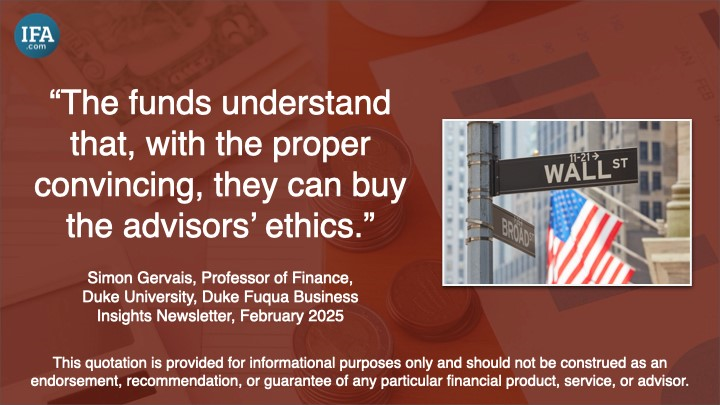Imagine trusting someone with your life savings — only to discover their advice could be tainted by hidden commissions.
When you go to a licensed physician, it's fairly safe to assume that any advice they give you will be in your best interests. Yes, there have been cases of misconduct, but most physicians are unlikely to recommend a particular drug or course of treatment over one that's more unsuitable because they're financially incentivized to do so.
Conflicts of interest among financial advisors have been a focus of academic studies, including Curtis, 2021, Sethi et al., 2019, and Egan et al., 2017. While such conficts exist in varying degress across the profission, many advisors word to manage this risks and prioritize client interests.
The authors of a new study on the subject suggest that such conflicts may be more prevalent than previously thought. In a paper entitled Ethics and Trust in the Market for Financial Advisors, Professor Simon Gervais from the Fuqua School of Business at Duke University and Professor John Thanassoulis from Warwick Business School, explain how advisors have commercial incentives to recommend certain products over others, even if the advice is not in their clients' best interests.
Here are some of their key findings:
- Asset management firms use commissions to incentivize financial advisors to favor their products
- While advisors can discern the most suitable option for their clients, the clients themselves cannot, which creates the potential for advisors to make recommendations that are not in their best interest
- Although many advisors are inherently ethical, others may act opportunistically if it is in their financial interest to do so
- Wealthy clients are particularly vulnerable to unsuitable advice because advisors may prioritize building a clean record to attract wealthy clients, but once they have those clients, they may be more likely to give inappropriate advice
- Research findings indicate that the prevalence of misconduct among advisors may increase later in their careers, as potential consequences for reputation and earnings decrease. Outcomes, however, vary significantly among individuals and firms.
- Improved regulation and better detection of misconduct don't always immediately reduce misconduct, as fund companies can respond by merely increasing the size of the commissions they offer
Scale of misconduct "eye-opening"
In a recent interview for the Duke Fuqua Business Insights Newsletter, Professor Gervais described the scale of misconduct in the U.S. advice profession as "eye-opening."
"There is more misconduct than we thought, despite the data being publicly available," he said. "We know that advisors, when they are caught, typically remain in the industry and move to different firms, some of which seem to specialize in hiring them. Also, there is more misconduct as advisors get older.
"The funds understand that, with the proper convincing, they can buy the advisors' ethics."

Professor Gervais also said that although financial advisor records are through the Financial Industry Regulatory Authority (Finra), it can be hard for consumers to find the information they need. "Searching is demanding," he said. "The data is not easily accessible and usable."
Good advice is highly valuable
Nevertheless, Professor Gervais still believes that a good financial advisor can offer substantial value, not least in protecting clients from bad decisions.
"Many people without financial advisors do weird things," he said. "I know a financial advisor who manages the money of some artists and professional athletes. Many of these clients want to open their own restaurants, which are oftentimes atrocious investment choices, as the lack of diversification means that they could lose tons of money. So the role of an advisor is simply to say why this doesn't make sense."
In addition, he said, good advisors help clients think about important issues such as taxes and insurance, "and about passing their money to their kids or spouses when they die."
Professor Gervais also offered advice to people when choosing a suitable advisor. "If an advisor is very good," he said, "they're not going to be insulted if you ask them ‘how do you get paid from this decision that I'm making?' The other thing I would try is to ask them about the financial products that they themselves buy."
What can investors learn?
For us at Index Fund Advisors, this latest research by Professors Gervais and Thanassoulis underscores the crucial importance of only working with a Registered Investment Advisor. RIAs are fiduciaries and are held to fiduciary standards by the U.S. Securities and Exchange Commission.
What does that mean? Well, a fiduciary is legally and ethically bound to act in your best financial interest at all times. This isn't just a suggestion; it's a core principle that sets them apart. Unlike brokers or other financial professionals who might only need to recommend "suitable" investments (which could still benefit them more than you), a fiduciary must put your needs first. Think of it as a fundamental loyalty, ensuring their advice is solely driven by what's best for your financial well-being and goals.
Why should you insist on a fiduciary? Because it offers a crucial layer of protection and trust in a complex financial landscape. Working with an advisor legally obligated to act as a fiduciary is intended to promote unbiased recommendations tailored to your financial objectives. However, individual outcomes may differ due to advisor-specific arrangements and unique market conditions. This transparency may contribute to more informed financial decision-making by avoiding conflicts of interest and ensuring you're on the right path to achieving your financial objectives.
In essence, choosing a fiduciary advisor provides peace of mind. You're working with someone who is legally and ethically obligated to be your advocate in the often-confusing world of finance. This commitment to your best interests can translate into more sound financial decisions, greater clarity about your investments, and ultimately, a higher likelihood of reaching your financial aspirations. Don't settle for anything less than this fundamental level of trust and accountability.
For more information on the importance of using a fiduciary advisor, read Step 12 of Mark Hebner's award-winning book, Index Funds: The 12-Step Recovery Program for Active Investors. You can read or listen to that chapter free of charge here.
ROBIN POWELL is the Creative Director at Index Fund Advisors (IFA). He is also a financial journalist and the Editor of The Evidence-Based Investor. This article reflects IFA's investment philosophy and is intended for informational purposes only.
This article is intended for informational purposes only and reflects the perspective of Index Fund Advisors (IFA), with which the author is affiliated. Quotes, insights, and findings from external research sources are provided for educational and illustrative purposes and do not represent the views, recommendations, or guarantees of IFA. Readers should understand that general academic findings may not directly apply to individual circumstances. No endorsement of specific researchers or their studies by IFA is implied.
References to fiduciary standards describe general principles under SEC regulations and are intended to provide guidance on the importance of fiduciary advice. Fiduciary obligations vary depending on disclosed conflicts and specific advisory arrangements, and investors should carefully review advisory disclosures provided on Form ADV prior to selecting a financial advisor. Transparency and a focus on fiduciary principles do not eliminate inherent investment risks or guarantee positive outcomes.
All investments carry risks, including potential loss of principal, market uncertainties, and fluctuations in returns. Past outcomes observed in other advisory arrangements are not guaranteed to repeat for future investors. Financial guidance should be tailored to individual situations, and readers are encouraged to consult a qualified Investment Advisor for advice specific to their goals and circumstances.
IFA shares third-party research findings and quotes as illustrative examples but does not guarantee the accuracy, completeness, or applicability of the information presented. Readers should verify information directly with the relevant third-party sources.
For more information about Index Fund Advisors, Inc., including disclosures about our methodologies, assumptions, and portfolio construction, please review our Form ADV brochure at https://www.adviserinfo.sec.gov/ or visit our website at www.ifa.com."














